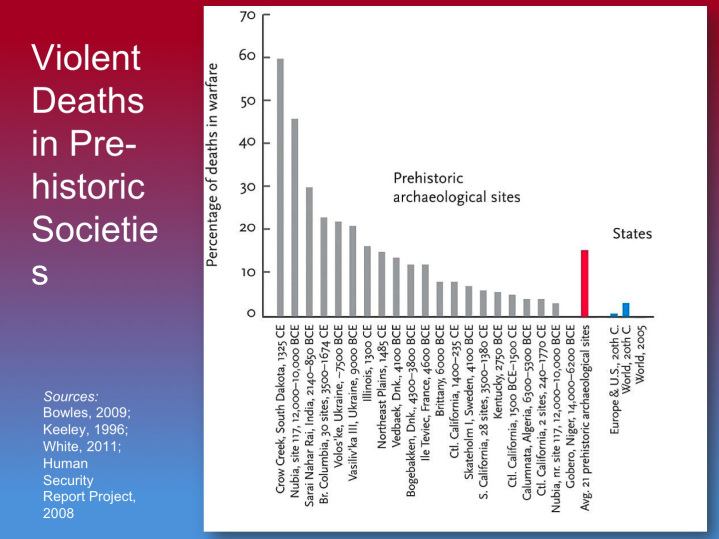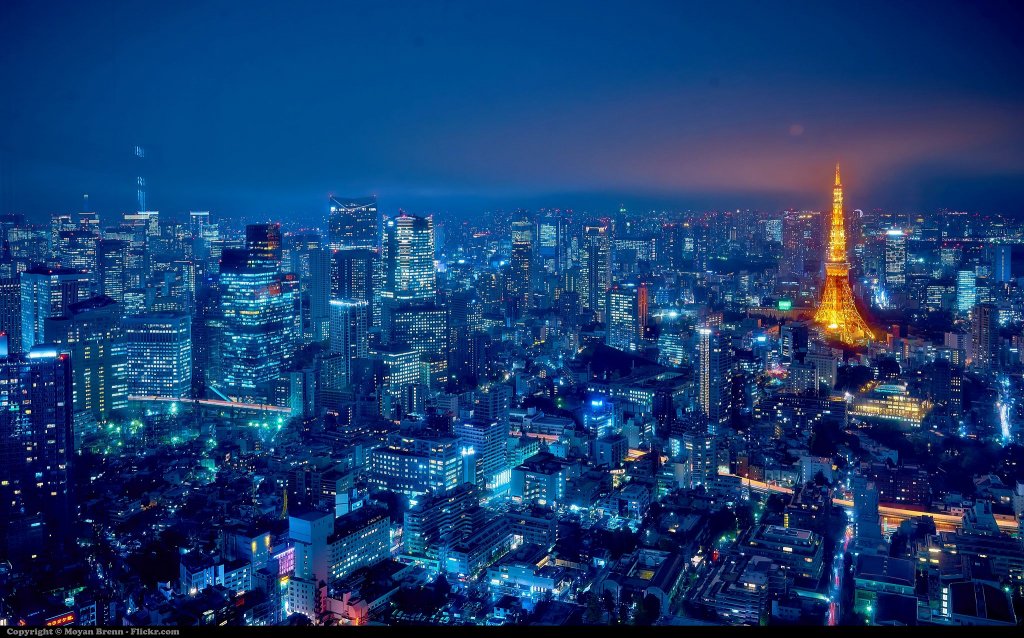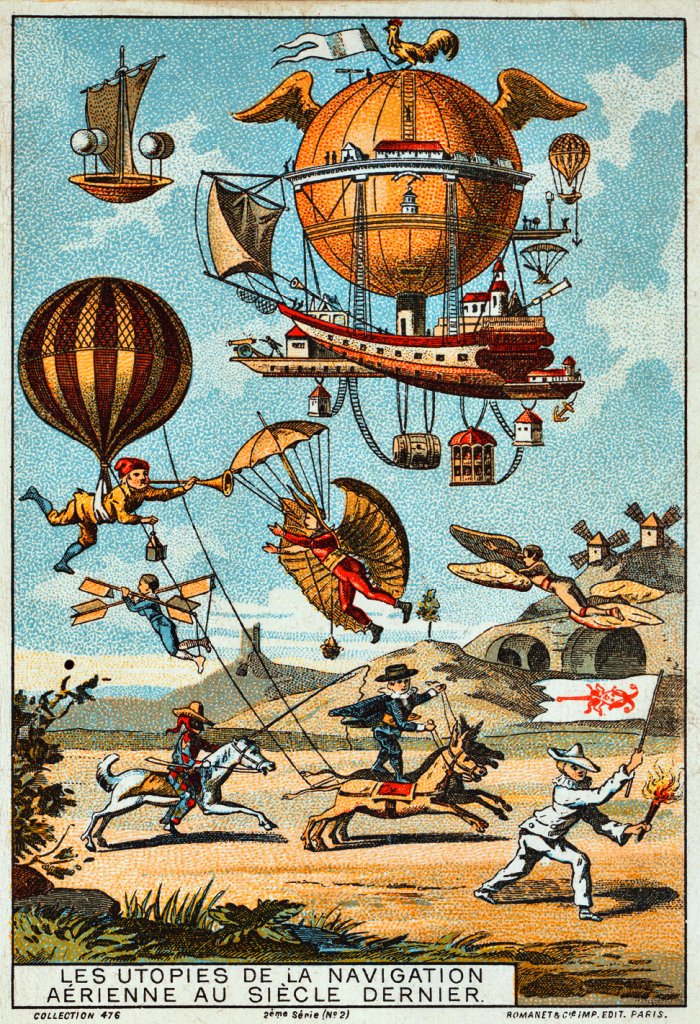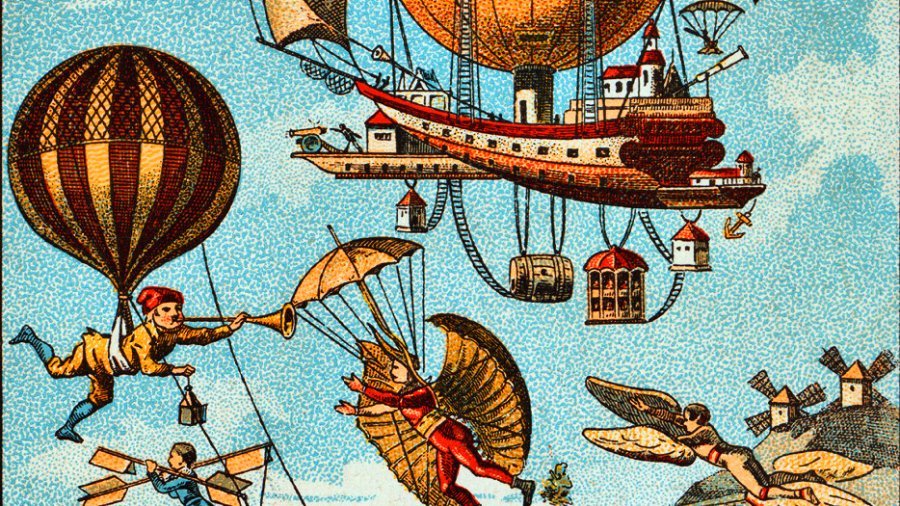My favorite Taoist-rapper-novelist KOOL A.D. once tweeted, “THE DIFFERENCE BETWEEN SCIENCE AND MAGIC IS MORE OR LESS ATTITUDINAL”.
I think this aphorism hints at a profoundly important truth: the truth of how fucking unbelievable and magical it is that we glorified chimpanzees have managed to create something of a miraculous techno-wonderland on a rock floating in space. Let me explain.
A 200,000-Year Flashback
Imagine being one of our earliest pre-linguistic ancestors, waking up from the pre-self-consciousness of early childhood one day to realize that you seem to be a self-contained creature moving around in some kind of colorful, textured environment. Your surroundings mainly consist of an interconnected mixture of dirt, trees, plants, rocks, water, and other creatures. Everything seems to be waving and swaying, vaguely alive. In this environment you and your tribe must somehow find a way to survive. You quickly realize that you need to find a means of converting these natural elements and other creatures into food, water, and shelter for yourself and your community, else you die. Oh, and you don’t have language and a bunch of natural forces and other creatures are trying to kill you.
It’s like some kind of twisted-ass video game on nightmare difficulty. You’re just thrust into this organic bramble of an environment in which nothing is self-evidently useful to you, and you have to figure out how the hell things work well enough to at least scrape out some kind of existence. And yeah you have deeply ingrained instincts that help you a lot, and sure, over time your culture builds up knowledge that helps you a lot. But even after your tribe has built up a heap of customs and cultural knowledge about how to survive the Mysterious Shitstorm, you’ve still got people dropping dead pretty regularly from sickness, natural disasters, generally harsh conditions, encounters with other predators, naturally occurring poisons, inability to find enough food, and violent run-ins with other human tribes.
I’m afraid I tend to side more with Tom Hobbes, who said that life for our early ancestors was “nasty, brutish, and short,” than with those who romanticize prehistoric human life. As it happens, Steven Pinker’s findings in his tour de force, The Better Angels of Our Nature—perhaps the most comprehensive study of violence throughout human history—back me up here. Early human beings had it rough.

Percentage of various historical populations that died in warfare. Source: The Better Angels of Our Nature by Steven Pinker
Holy Contrast, Batman!
Anyway, the reason I wanted to paint that picture is to highlight what is probably the most striking historical contrast yet to occur on this planet. Somehow, after emerging in that hostile labyrinth of mostly dirt, trees, and rocks, we humans managed to construct towering, shimmering, marvelous cityscapes that would make our early ancestors’ brains turn to pablum.
Surely if one of our distant ancestors were somehow teleported to modern Tokyo, they would be overcome by an ineffable wonder and terror. Surely they would feel they were in the presence of gods.

Tokyo. Imagine seeing this for the first time. (Photo by Moyan Brenn)
Consider for a moment the miracle of something as commonplace as a smartphone and a pair of headphones. These devices are so ubiquitous at this point that we take them utterly for granted. “Oh, yeah, cool, a new iPhone is coming out, bro.”
But, but, dude, I don’t think you get it: Somehow, out of dirt, trees, and rocks, in a clusterfuck of an environment in which most everything was trying to kill us, our species managed over time to devise an unspeakably complex recipe—a recipe so complex that only a tiny percentage of the 7 billion currently-living humans understand it—a recipe for painstakingly converting dirt and rocks into a pair of inscrutable, beautiful devices that somehow allow us to listen, in high fidelity, to literally millions of the greatest songs our species has ever created. At a moment’s notice, we can conjure almost any pleasant sound ever recorded by one of our fellow humans and pour its wondrous textures directly into our ear-holes, with a level of sound quality that would make Mozart shit his pants.
And that’s just one example, though for me the unparalleled level of music accessibility enabled by modern technology is already enough to make me feel that we’re living in the greatest Golden Age our species has ever witnessed. My quality of life has been enhanced dramatically as a result of the humans who actualized this state of affairs. I can’t even imagine living without the Internet, computers, and my beloved headphones, and I hope I never have to.
Now imagine all the other things that we somehow invented recipes for over the course of a few tens of thousands of years: comfy-ass beds, pillows, running water, plumbing systems, lightbulbs, remarkably sturdy and beautiful homes, video game consoles, air conditioners, airplanes, Uber, AirBnb, bicycles, electric automobiles, hot freaking showers, refrigerators, Twitter, Pocket, vastly diverse forms of delicious food, microwaves, virtual reality, satellites, blockchains, hyper-efficient mediums of exchange (i.e. money), ridiculously elaborate and speedy supply chains, a mind-boggling global infrastructure that supports 7 billion of us pretty well, bunches of art forms, YouTube, Insight Timer, stoves, metal cookware, blogs/publications, gorgeous architecture, vaccines, staggering medical technologies, submarines, cruise ships, eco-villages, solar panels, cryptocurrencies, space heaters, Earthships, hexayurts, tiny homes, indoor swings, libraries, windows, bunches of engrossing sports and games, countless fantastic varieties of cannabis and craft beer, Reddit, concerts and LOUD-ASS speakers, gobs of restaurants, microphones, paved roads, podcasts, artificial intelligence, systems of law and order, spaceships, Mars rovers, a higher global standard of living than ever, a greater degree of global peace and safety than any other time, Google, power tools, Couchsurfing, Wikipedia, Skyscanner, co-existence with animal friends, absurdly comfortable clothing of every imaginable aesthetic, regulated capitalism, democracy, human/animal rights, civil liberties, lotions, natural remedies, Evernote, towels, kayaks, dream-like footwear, Kindles, Macbooks, Netflix, carpet, stained mahogany floors, soul-cradling couches, hammocks, goddamn agriculture, and on and on and on and on.
The recipes required for all of these items to exist simultaneously and function together as well as they do are mind-fuckingly complex. The level of complexity puts the most complex spell in a hypothetical witch’s spell book to shame. Forget tracking down eye of newt and firstborn’s blood; try converting dirt, rocks, and trees into a functional global techno-civilization that meets nearly everyone’s basic needs and allows billions of people to live like gods. Now that’s a bloody magic trick.

‘The Dream of Flight,’ Artist Unknown. (Source)
Normalized Wonderland
And yet most of us take all this for granted. It’s just kind of the unquestioned aquarium. Inventions become normalized almost immediately as they enter the public imagination, which results in billions of humans living in techno-wonderland and not realizing it.
A lot of people, instead of appreciating this Promised Land thousands of years in the making, spend most of their time finding absurd things to complain about, like our general rules about who can use which bathroom. Things are so damn good that we have to invent things to get pissed off about.
And look, don’t get me wrong: There are genuinely a lot of real problems that we should care deeply about solving: most notably things like existential risks, global extreme poverty, mass-scale animal cruelty, overpopulation, human slavery and trafficking, unjust laws and institutions worldwide, and violent extremism.
And yes, those are some giant and shitty problems, I do not deny. But let’s be honest with ourselves: In a hyper-complex world of 7 billion humans and trillions more sentient beings, we should expect that even in the most unprecedented Golden Age, there will still be plenty of bullshit to deal with.
But if you have integrity you won’t focus exclusively on and yell endlessly about the things that are shitty without also acknowledging the abundant number of things that are the polar opposite: like, oh, you know, that whole thing about miraculously pulling ourselves out of the brutal state of nature into walled gardens of civilization that shield us from the ever-present chaos and danger that once tore our ancestors limb from limb, and then padding those civilizations with technological marvels that make our lives insanely comfortable, give us instant access to millions of terabytes of history’s beauty, and endow us with myriad god-like superpowers. Yeah, that whole thing.
I’m honestly pretty damn tired of seeing a momentous-ass mountain of pessimism about the state of the world polluting every social channel, with almost zero mention of THE FACT THAT WE’RE IN GODDAMN NARNIA. I completely understand that we need to address pressing global issues, but we should also realize that the world will never be perfect and learn to appreciate it in its current form. What’s the point of working to improve the world if we never stop to appreciate and enjoy it?
Negativity Bias
So why do people have such a hard time appreciating the wondrous aspects of our present world? Part of what is going on here, I think, has to do with how our brains work: Human beings are well-known to have what’s called a negativity bias: we give more weight to negative events/things than positive ones, and negative emotions impact us more deeply.
Imagine how this individual effect compounds in our collective thought-space. One would expect us to have an immense collective bias toward noticing and talking about everything that’s wrong with the world, rather than everything that’s fantastic. And anyone who’s spent any time on social media can attest that this is precisely what one observes today. I guess that wily old scrivener Dostoyevsky hit the proverbial nail on the head when he said, “Man only likes to count his troubles; he doesn’t calculate his happiness.”
And the effects of our collective negativity bias are further compounded by the fact that the Internet has made us exponentially more aware of all the shitty things going on in the world than ever before. Videos of the billions of people living in relative peace and happiness do not go viral. “News” is basically a euphemism for Cherry-Picked Tragedies of Earth. This gives the impression that the world is going to hell, when in fact the opposite is true, in many ways. As Ray Kurzweil put it:
“People think the world’s getting worse, and we see that on the left and the right, and we see that in other countries. People think the world is getting worse… That’s the perception. What’s actually happening is our information about what’s wrong in the world is getting better. A century ago, there would be a battle that wiped out the next village, you’d never even hear about it. Now there’s an incident halfway around the globe and we not only hear about it, we experience it.”
So, anyway, negativity bias, more information via the Internet, and the normalization of new utopian technologies contribute to a situation in which the shittiest things about the present are impossible to ignore, while the best things are largely invisible. I’m reminded of some relevant lyrics in a recent rap song of mine, which, if you’ll indulge me, I will now share with you:
Things seem so fucked not because it’s all broken
But because you now have a billion times more info, kid
Your newsfeed shows you a steady stream of tragedies
And you assume the world is now unprecedentedly nasty
When really we’ve seen colossal declines in violence and poverty
We may actually get everyone past that first level of Maslow’s hierarchy
You compare our reality with your idealized fantasy
And in doing so you commit the Nirvana fallacy
No political or economic system is ever utopian
The belief in a perfect system led to Hitler and Stalin
There are more ways to break complex systems than improve them
So it’s some degree of gradualism for the win
Please simply consider the virtues of pragmatism
And the idea that modern civilization is actually pretty bitchin’
A bulwark against Hobbes’ “war of all against all”
And it gave us iPods, running water, science, electricity y’all
Consider for a moment how fucking great all that shit is
And you want to tear it down and live totally primitive?
Nah, not me, too much love for the Internet
I’ll live in an off-grid cabin customized with modern tech
Or maybe a tiny home or a hexayurt
On my Carl Sagan shit, cherishing this sexy Earth
This “Wonderland” is “Magical,” Dude
What we’ve managed to do on this planet is a bloody miracle. It’s fucking magic. And it’s worth using terms like “magic” and “miracle” and “wonderland” to describe it, so as to re-condition your brain to actually fucking gawk at it and ponder the fucking lightyears we have traveled since the days we all slept on dirt floors, wore itchy-ass clothes, ate anything remotely edible, watched the grass grow, and lived in a near-constant state of vigilance, waiting for the next time nature decided to shit on us or our friends. If the elaborate recipes we’ve concocted to create this world don’t qualify as “magic spells,” I’m not sure what would.
And look, I’m not saying what we’ve done is literally supernatural or anything. All of it seems to be permitted by the laws of physics. What I’m encouraging is something more along the lines of soaring secular awe—a sense of unapologetic astonishment and gratitude in light of the fact of our apparent wizardry. And if calling our techno-boons “wizardry” or “enchantments” helps you remain in touch with that soaring wonder, then maybe such terms are, in an odd way, more accurate and honest ways of describing our situation than their humdrum alternatives (e.g. “science,” “tech,” “gadgets,” etc.). In the same way that I sometimes refer to nature as “God” or “divine” or “sacred” to affirm my most profound experiences of secular awe and reverence, I refer to our civilizational superstructure and technologies as “magic” or “wizardry” to affirm and remind myself of my most dumbfounding realizations of just how FUCKING EXTRAORDINARY it is that we somehow built all of these enchantments out of next to nothing. It’s a goddamn Christmas miracle.
Conclusion: Let’s Not Fuck This Up
Anyway, I think I’ve made myself clear, so it’s probably about time to wrap this thing up. In sum, notice the magic that is all around you. Nature itself is even more of a sublime mindfuck than the parts of it which are manmade. We’re living in something of a techno-dreamland within an infinitely grand and glorious (and, yes, terrifying) cosmos. Hell to the fuck yeah!
And like, above all, can we make sure we don’t destroy ourselves or massively fuck all our shit up? Can we please peacefully cooperate as we tackle our remaining global issues and check them off our collective to-do list? Can we coexist compassionately, sustainably, self-reliantly, and non-dogmatically as we press onward into the great unknowns of the 21st century? Pretty, pretty fucking please?
Because, like, man, shit is finally starting to get really, really, REALLY good for humanity. We’re entering a period in which it’s looking more and more likely that we’ll find a way to meet every human’s basic needs, massively reduce animal suffering, and allow all of us to live like demigods. We’re bearing witness to some of the most legendary magic tricks our species has ever pulled off. I so, so do not want to see us fuck up all this potential by letting the dumbass prehistoric aggressively tribal parts of our brains convince us to burn civilization to the ground or use weapons of mass destruction on one another. GTFO.
So, yeah, can we maybe just spend more time appreciating and enjoying the heavenly aspects of the world we made and less time screaming about how the hellish aspects completely outweigh everything else? Can we recognize the ways in which our world is a paradise while still working diligently and methodically to make it even better? That would be fucking lovely.
Once more, you’re an advanced ape whose species has somehow erected a magical techno-wonderland on a rock in a cosmos of infinite possibility. And now you know it. So spread the good word, kid.
About Jordan Bates
Jordan Bates is a Lover of God, healer, mentor of leaders, writer, and music maker. The best way to keep up with his work is to join nearly 7,000 people who read his Substack newsletter.





Always insightful and optimistic, you. Good for me to hear views like this.
thanks, man : ] this is definitely hyper-optimistic — perhaps a bit too biased in that direction. the risks that are emerging as our technology gets more and more powerful are deeply frightening and are vital to consider, to temper techno-optimism. but for the time being at least, things are pretty damn good for billions of people.